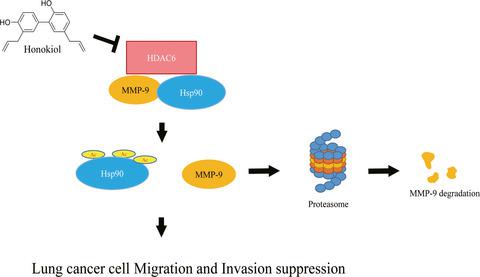当前位置:
X-MOL 学术
›
Food Sci. Nutr.
›
论文详情
Our official English website, www.x-mol.net, welcomes your
feedback! (Note: you will need to create a separate account there.)
Suppressing migration and invasion of H1299 lung cancer cells by honokiol through disrupting expression of an HDAC6-mediated matrix metalloproteinase 9.
Food Science & Nutrition ( IF 3.5 ) Pub Date : 2020-02-06 , DOI: 10.1002/fsn3.1439 Jih-Tung Pai,Chia-Yun Hsu,Yei-San Hsieh,Tsung-Yu Tsai,Kuo-Tai Hua,Meng-Shih Weng
Food Science & Nutrition ( IF 3.5 ) Pub Date : 2020-02-06 , DOI: 10.1002/fsn3.1439 Jih-Tung Pai,Chia-Yun Hsu,Yei-San Hsieh,Tsung-Yu Tsai,Kuo-Tai Hua,Meng-Shih Weng

|
Metastasis is the crucial mechanism to cause high mortality in lung cancer. Degradation of extracellular matrix (ECM) by proteolytic enzymes, especially matrix metalloproteinases (MMPs), is a key process for promoting cancer cell migration and invasion. Therefore, targeting MMPs might be a strategy for lung cancer metastasis suppression. Honokiol, a biological active component of Magnolia officinalis, has been indicated to suppress lung cancer tumorigenesis through epigenetic regulation. However, the regulation of MMPs‐mediated migration and invasion by honokiol through epigenetic regulation in lung cancer is still a mystery. In the present study, the migration and invasion ability of H1299 lung cancer was suppressed by noncytotoxic concentrations of honokiol treatment. The proteolytic activity of MMP‐9, rather than MMP‐2, was inhibited in honokiol‐treated H1299 cells. Honokiol‐inhibited MMP‐9 expression was through promoting MMP‐9 protein degradation rather than suppressing transcription mechanism. Furthermore, the expression of specific histone deacetylases 6 (HDAC6) substrate, acetyl‐α‐tubulin, was accumulated after honokiol incubation. The disassociation of MMP‐9 with hyper‐acetylated heat shock protein 90 (Hsp90) was observed resulting in MMP‐9 degradation after honokiol treatment. Meanwhile, honokiol‐suppressed MMP‐9 expression and invasion ability of H1299 lung cancer cells was rescued by HDAC6 overexpression. Accordingly, the results suggested that the suppression of migration and invasion activities by honokiol was through inhibiting HDAC6‐mediated Hsp90/MMP‐9 interaction and followed by MMP‐9 degradation in lung cancer.
中文翻译:

厚朴酚通过破坏HDAC6介导的基质金属蛋白酶9的表达来抑制H1299肺癌细胞的迁移和侵袭。
转移是导致肺癌高死亡率的关键机制。蛋白水解酶特别是基质金属蛋白酶(MMP)降解细胞外基质(ECM)是促进癌细胞迁移和侵袭的关键过程。因此,靶向MMPs可能是抑制肺癌转移的一种策略。厚朴酚,厚朴的生物活性成分,已表明通过表观遗传调控来抑制肺癌的肿瘤发生。然而,厚朴酚通过表观遗传调控肺癌中MMPs介导的迁移和侵袭的调控仍然是一个谜。在本研究中,通过厚朴酚的非细胞毒性浓度抑制了H1299肺癌的迁移和侵袭能力。在厚朴酚处理的H1299细胞中,MMP-9而不是MMP-2的蛋白水解活性受到抑制。厚朴酚抑制MMP-9的表达是通过促进MMP-9蛋白质降解而不是抑制转录机制。此外,厚朴酚孵育后会积累特定的组蛋白脱乙酰基酶6(HDAC6)底物乙酰基-α-微管蛋白的表达。观察到厚朴酚处理后MMP-9与高乙酰化热激蛋白90(Hsp90)的解离导致MMP-9降解。同时,HDAC6的过表达可以挽救厚朴酚抑制的MMP-9表达和对H1299肺癌细胞的侵袭能力。因此,结果表明,厚朴酚抑制迁移和侵袭活性的方法是抑制HDAC6介导的Hsp90 / MMP-9相互作用,然后抑制MMP-9降解。
更新日期:2020-02-06
中文翻译:

厚朴酚通过破坏HDAC6介导的基质金属蛋白酶9的表达来抑制H1299肺癌细胞的迁移和侵袭。
转移是导致肺癌高死亡率的关键机制。蛋白水解酶特别是基质金属蛋白酶(MMP)降解细胞外基质(ECM)是促进癌细胞迁移和侵袭的关键过程。因此,靶向MMPs可能是抑制肺癌转移的一种策略。厚朴酚,厚朴的生物活性成分,已表明通过表观遗传调控来抑制肺癌的肿瘤发生。然而,厚朴酚通过表观遗传调控肺癌中MMPs介导的迁移和侵袭的调控仍然是一个谜。在本研究中,通过厚朴酚的非细胞毒性浓度抑制了H1299肺癌的迁移和侵袭能力。在厚朴酚处理的H1299细胞中,MMP-9而不是MMP-2的蛋白水解活性受到抑制。厚朴酚抑制MMP-9的表达是通过促进MMP-9蛋白质降解而不是抑制转录机制。此外,厚朴酚孵育后会积累特定的组蛋白脱乙酰基酶6(HDAC6)底物乙酰基-α-微管蛋白的表达。观察到厚朴酚处理后MMP-9与高乙酰化热激蛋白90(Hsp90)的解离导致MMP-9降解。同时,HDAC6的过表达可以挽救厚朴酚抑制的MMP-9表达和对H1299肺癌细胞的侵袭能力。因此,结果表明,厚朴酚抑制迁移和侵袭活性的方法是抑制HDAC6介导的Hsp90 / MMP-9相互作用,然后抑制MMP-9降解。











































 京公网安备 11010802027423号
京公网安备 11010802027423号